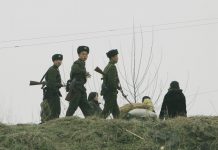Wholesalers of consumer goods such as imported garments and shoes in Yanggang Province are upset because market vendors cannot keep up with their payments, Daily NK has learned.
“The wholesalers who supply clothes and shoes to Hyesan marketplaces have been in serious trouble recently. Vendors at the marketplaces are unable to collect the goods they sold on credit, and the situation is so bleak that they have no idea when the money will come,” a source in the province told Daily NK on Monday, speaking on condition of anonymity.
According to the source, goods such as Chinese-made clothing and shoes were easier to find this year than in previous years at marketplaces in Hyesan and other towns along the province’s border with China. But North Koreans’ financial woes are keeping them from buying much, hurting not only the market vendors but also the wholesalers who supply the vendors with their goods.
“There are a lot of Chinese products available in the marketplaces right now, but there are fewer customers because of the financial difficulties. As a result, many vendors go all day without selling a single item,” the source said.
Under these circumstances, market vendors are forced to sell items on credit, leaving them with no cash to pay wholesalers.
Worse, wholesalers are not receiving payment for goods shipped inland, leaving some wondering if they would be better off not doing business at all, the source said.
One wholesaler who imported goods from China in January was so stressed after two months of no payment from vendors who took his goods on credit that he fainted.
“Vendors in the marketplace are in tears over their poor sales, and when wholesalers press them for money, the sellers can only offer to return their products. The vendors say life isn’t worth living if they have to be harassed for money after not selling anything all week,” the source said.
The growing availability of products may make it seem like the marketplaces are bustling, but that is far from the reality, the source said.
“When ordinary people are facing such financial hardship that they are struggling to put food on the table, vendors of consumer goods can do little but stare at the products stacked on their tables,” the source said.
“The basic issue of hunger has to be addressed if people are going to buy clothes and shoes in the marketplace. Since they can’t afford to do that right now, both the market vendors and the wholesalers who supply them are in a world of hurt.”
Translated by David Carruth. Edited by Robert Lauler.
Daily NK works with a network of sources living in North Korea, China, and elsewhere. Their identities remain anonymous for security reasons. For more information about Daily NK’s network of reporting partners and information-gathering activities, please visit our FAQ page here.
Please send any comments or questions about this article to dailynkenglish@uni-media.net.


















